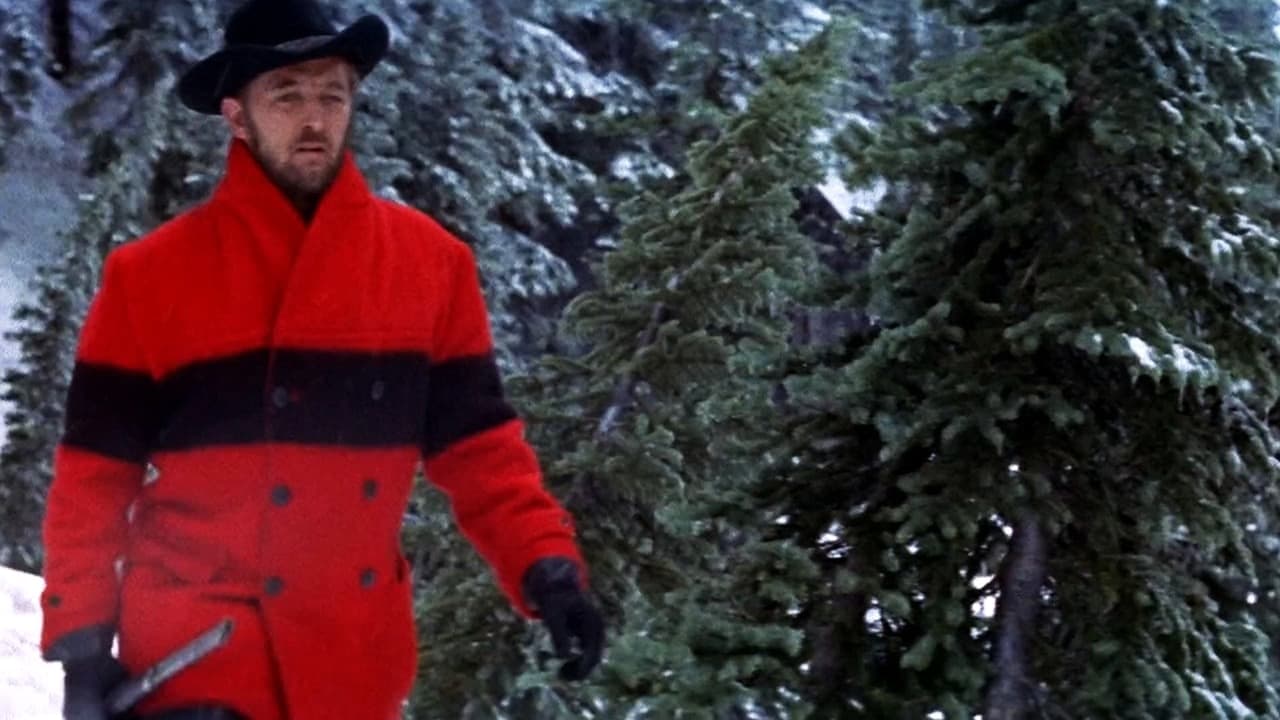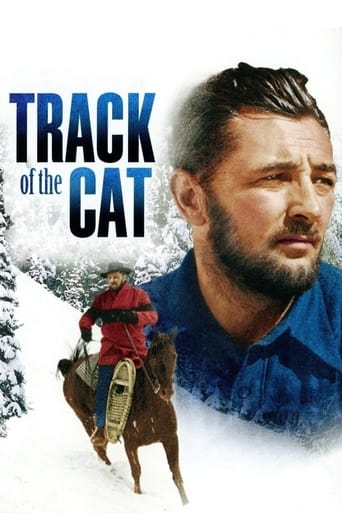

Robert Mitchum puts in an outstanding performance here as the mean son at the head of a dysfunctional family in a harsh snowy landscape at around the turn of the century. Mitchum's is a detailed performance worth watching very closely to observe a great actor in action.The film is fascinating boasting several strong characters at variance to each other, including an extrovert but unrealistic alcoholic father, a dried-up, sniping bible thumping mother and a thoughtful, kind older brother as well as Mitchum. Then there is the startling outdoors photography in the snowy mountain landscape. Mitchum remembered the film as the toughest he had ever been through. The snow is the backdrop for a panther legend believed by the old Indian help and played out for real as a panther is known to be in the area attacking the livestock. Two of the brothers try to track it down while the remaining family members in the home experience shifts in the balance of power.Track of the Cat is a stylised, expressionistic film that reminds of Charles Laughton's film with Robert Mitchum, The Night of the Hunter. So many of even Mitchum's best regarded films are very flawed, but Track of the Cat has many strengths not least a star on searing top form.
... View MoreI saw this with a couple of other kids in a theater when it was released and remarked that it wasn't the action movie I'd been hoping for. Our resident genius replied, "Dis is what dey call a MELOdrama." That kid was absolutely right. A true mental giant, he probably went on in life to invent string theory or something.It's 1876 and the Bridges family lives way up in the mountains, deep snow heaped all over the place. A cougar has been nipping at the cattle, and now it has nipped Arthur, one of the Bridges sons, and killed him. That leaves Ma and Pa Bridges with only two sons -- arrogant but cowardly Robert Mitchum and well-meaning but submissive Tab Hunter. Pa Bridges is a burned-out drunk. Ma Bridges is a Bible-spouting virago who dominates everything. Teresa Wright is the washed-out middle-aged daughter whose life is in ruins. Diana Lynn is Tab Hunter's visiting girl friend, whom Ma doesn't like because Lynn's desperate feminity threatens Ma's domain.It's talky and unpleasant. Everybody argues with everybody else in a neat farm house with white interiors. Pa flails around, boozed up, with nothing sensible to say. Diana Lynn and, later, Wright, keep urging Tab Hunter to run off to Aspen, marry Lynn, and start his own life. He agrees but then something always kneecaps his intentions until the next time he decides to go, when something else will deter him. It's pretty dull.The one thing that can't be faulted is William Clothier's photography. There's never been anything quite like it. The screen is almost drained of color, but who needs it? Jagged dark peaks rise above vast fields of pristine snow, where there may be nothing but the tracks of a man or a cougar. The evergreens are almost everblack. And Clothier has captured tentacles of gossamer mist gradually climbing the dark crests as if the vaporous gauze itself were animate.Without those exteriors on Mount Ranier, what you've got is a poorly drawn melodrama.
... View MoreDomineering middle child Robert Mitchum and his mother holds the rest of the family under their thumb, especially youngest child Tab Hunter, whom Mitchum takes particular delight in brow-beating. Tensions boil over on a snowy Winter, when a dangerous mountain lion descends on the valley and begins to kill livestock.Not an outdoor adventure, this is instead a depressing, talky frontier drama full of irritating, unsympathetic characters. There's some good performances, especially by the female cast members, though little else to offer the average film-goer looking for escapist entertainment.Similarly themed and much more exciting, was the low-budget 1949 film The Big Cat, directed by Phil Karlson and starring Preston Foster and Forrest Tucker. In that one you at least get to see the cat!
... View MoreI found this movie very dreary, distracting, and slow going. Don't know if this was the intent of the production team, but if it was they succeeded admirably. Basically all it was to me was the very depressing story of an annoyingly dysfunctional family with seemingly very little else to offer the world --- not the kind of neighbors I would like near my ranch. Production-wise I did like Robert Mitchum's red coat and the movie did bring out the ultimate dreariness of wide open snow country. Some people like this sort of slow going, dysfunctional-family in the movies stuff. I generally don't, especially when the movie drags on as this movie does. Never thought I would place any Robert Mitchum or Teresa Wright (despite her relatively minor role) movie on my not-to-watch-again list of older movies, but that's where this film goes. One viewing is barely tolerable, any more would be just too taxing. I guess I'm not "sophisticated" enough. It's not why I watch movies. Blah!
... View More